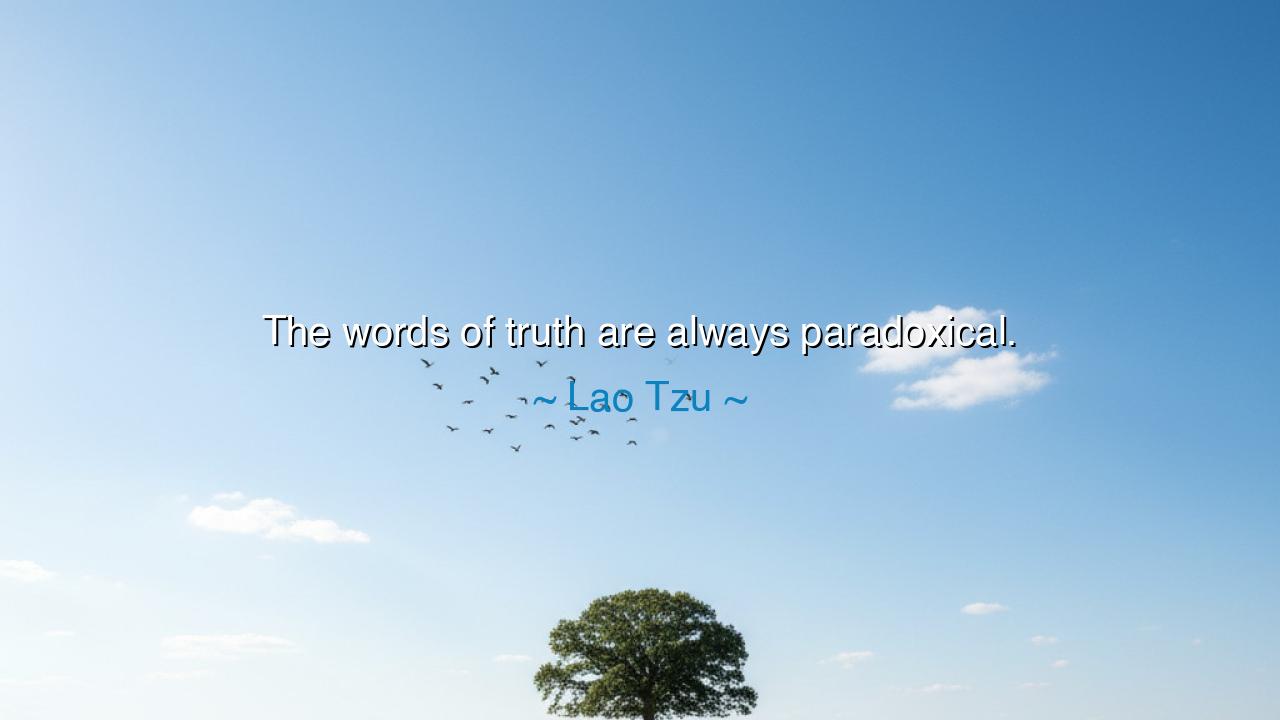
The words of truth are always paradoxical.






Lao Tzu, the sage of the Tao, once declared: “The words of truth are always paradoxical.” In these few words, he offered a vision of wisdom that confounds the simple mind but awakens the soul. For truth is never a flat surface; it is a mountain seen from many sides, a river that bends and flows. When put into words, it appears to contradict itself, because the infinite cannot be captured in a single phrase. To say the words of truth is to hold two opposites at once—strength and weakness, fullness and emptiness, life and death—and to see that they are not enemies, but companions.
The paradox lies at the heart of existence itself. To yield is to be strong. To be soft is to endure. To let go is to possess. These sayings, scattered throughout the Tao Te Ching, appear as riddles to the hurried mind, yet they are revelations to the one who contemplates. Lao Tzu knew that the way of the Tao, the eternal path of harmony, cannot be explained in straight lines. It is the crooked path that leads the traveler home. The truth is thus paradoxical, for it mirrors the mystery of the universe, where opposites interweave and create balance.
History gives us countless examples. Consider Mahatma Gandhi. His weapon was not the sword, but nonviolence. At first, this seemed a contradiction—how could refusing to fight ever defeat an empire armed with guns and armies? And yet, the truth of his paradox shook the might of Britain, not by destruction, but by conscience. His weakness was his strength, his surrender his triumph. In this way, the wisdom of Lao Tzu breathed through history, showing that the highest truths will always appear upside-down to the eyes of the world.
Even in science, the same holds. Light behaves both as a particle and as a wave. How can it be two things at once? To the rigid mind, this is absurd, but to the seeker of truth, it is the paradox that reveals the deeper mystery. The world is not bound by the logic of human comfort. It is greater, stranger, more wondrous. And so the words of truth, spoken honestly, will often sound like riddles or contradictions.
The lesson for us is clear: when you hear a teaching that seems paradoxical, do not dismiss it. Instead, sit with it, turn it over in your heart, and let it reveal the deeper harmony. The greatest wisdom is not found in simple answers, but in the tension between opposites. To cling only to one side of a truth is to be unbalanced; to embrace the paradox is to begin to walk the Way.
Practical action is to practice patience with paradox. When life offers you suffering, see also the seed of growth it contains. When you encounter weakness, look for the hidden strength within it. When you feel empty, recognize that emptiness is the space where new life can enter. Live with the awareness that the truth is not one-sided. Let paradox teach you humility and openness, for only then can wisdom take root.
Thus, remember Lao Tzu’s words: “The words of truth are always paradoxical.” If what you hear seems simple and flattering, be cautious—it may not be truth. If what you hear seems difficult, contradictory, and yet strangely resonant, then lean closer—for it may carry the fragrance of eternity. In paradox, the soul is stretched, the mind is humbled, and the heart is awakened. This is the path of the ancients, the way of harmony, the road that leads beyond illusion into the living truth.






KTAnh khoa Tran
I find Lao Tzu’s assertion about truth being paradoxical both enlightening and puzzling. On one hand, it suggests that truth can’t be fully understood unless we embrace its contradictions. On the other, it raises the question—can something truly be considered ‘truth’ if it’s inherently contradictory? Could our understanding of truth change over time as we discover new perspectives or interpretations? How do we reconcile opposing truths in our daily lives?
GDGold D.dragon
Lao Tzu’s view on the paradoxical nature of truth brings up an interesting point: if truth is always paradoxical, does that mean our understanding of it is always incomplete or evolving? Could it be that we only grasp parts of the truth at different times, and it’s only through seeing contradictions that we can get closer to a more complete understanding? What are the implications of accepting paradox in our quest for truth?
NANgoc Anh
This quote makes me reflect on how many truths we encounter in life that seem to contradict each other. Is it possible that truth, by its very nature, holds opposing elements that are both necessary for understanding the bigger picture? Could Lao Tzu be suggesting that we must accept paradox in order to truly comprehend life’s complexities? How do we find clarity in a truth that seems to be both this and that at once?
BDthai bao duy
Lao Tzu’s quote seems to suggest that truth is inherently complex and multifaceted, always holding contradictions within itself. I wonder why truth has to be paradoxical—why can’t it be straightforward? Could it be that paradoxes reveal deeper layers of truth that are not immediately apparent? How do we reconcile seemingly contradictory truths in our own lives? Do these contradictions make truth more profound, or do they complicate our understanding?